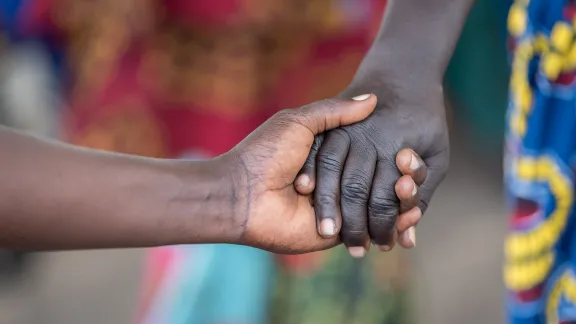
Women from a program in Uganda walk hand in hand. Photo: LWF/A. Hillert
Lutheran churches around the world are very different. They all live in their own contexts, have specific challenges and an individual history. “No church is so large or rich that it is not dependent on the gifts of others. No church is so small or poor that it cannot enrich others.” This is how former LWF President Bishop Josiah Kabira from Tanzania once expressed his vision of the Lutheran World Federation (LWF).
In the LWF, projects are carried out by LWF member churches worldwide. They can have a pastoral, theological, missionary or diaconal focus - in the Global South, but also in Europe. The projects are supported and financed by the LWF communion. They are intended to contribute to the church's living embodiment of the Gospel.
As part of the LWF, we as the German National Committee of the Lutheran World Federation (GNC/LWF) also maintain direct relationships with numerous member churches of the LWF worldwide. This takes the form of regular exchanges of information, mutual visits, reciprocal invitations to synods and other meetings, as well as support for measures and projects. Fundamental issues and political developments in our different contexts are followed closely and discussed together.
The German churches are blessed with material resources that are not available in many parts of the world. They are used to support sister churches worldwide. The GNC/LWF works closely with partner organizations.
Cooperation and coordination with partner organizations
Internationally, contacts with supra-regional associations and ecumenical organizations are important anchors, for example with the Lutheran Communion in Southern Africa (LUCSA) or the Program for Christian-Muslim Relations in Africa (PROCMURA) based in Nairobi, Kenya.
Close cooperation and coordination with partners in Germany is important to the GNC/LWF in these tasks. First and foremost is the VELKD , but the exchange with the responsible departments of the EKD, other mission organizations and regional associations is also of great importance. There is intensive cooperation and exchange with the individual Lutheran mission organizations as well as with the umbrella organization Evangelische Mission Weltweit (EMW) and the Martin-Luther-Bund. There is also long-standing and good cooperation with other partners, such as Bread for the World.
These relationships can be experienced in a special way in Lutherstadt Wittenberg. Several times a year, the LWF Center Wittenberg brings together seminar groups with participants from all regions of the world. And the Luther Garden, a project for the 500th anniversary of the Reformation in 2017, is a living monument to ecumenism and reconciled diversity with its 500 trees, each planted by a church.
Historical roots
Relations between churches across national borders often have historical roots. The historical links with Lutheran churches in Central and Eastern Europe are particularly strong, and geographical proximity makes it easier to establish direct contact. Since the Reformation, Germany has been a primary point of reference for all Lutheran churches in this region in matters of doctrine, the training of pastors (and subsequently also of female pastors) and the development of the church system. Many Lutheran churches, for example in the Netherlands, Great Britain, Italy and Poland, have been strongly influenced by immigrant Germans throughout their history. This also applies to some churches in Latin America: in their beginnings, they were shaped or founded by immigrants. Today, however, this influence has greatly diminished.
The centuries-long missionary and development work of the Lutheran churches in Europe also forms the basis for many of the relationships in the regions of Africa, Asia, Australia and the Pacific as well as Latin America and the Caribbean.